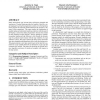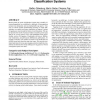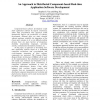1348 search results - page 157 / 270 » A Temporal Programming Language for Heterogeneous Informatio... |
DLS
2008
13 years 10 months ago
2008
Static and dynamic type systems have well-known strengths and weaknesses. Gradual typing provides the benefits of both in a single language by giving the programmer control over w...
ER
2008
Springer
13 years 10 months ago
2008
Springer
Access limitations may occur when querying data sources over the web or heterogeneous data sources presented as relational tables: this happens, for instance, in Data Exchange and ...
CIKM
2008
Springer
13 years 10 months ago
2008
Springer
Recent growth of social classification systems due to steadily increasing popularity has established a multitude of heterogeneous isolated, non-integrated, and non-interoperable t...
CSFW
1999
IEEE
14 years 1 months ago
1999
IEEE
Software systems are becoming heterogeneous: instead of a small number of large programs from well-established sources, a user's desktop may now consist of many smaller compo...
ISORC
1998
IEEE
14 years 1 months ago
1998
IEEE
Component-based software development would allow application software be largely constructed, rather than programmed. This approach would dramatically improve the productivity of ...



